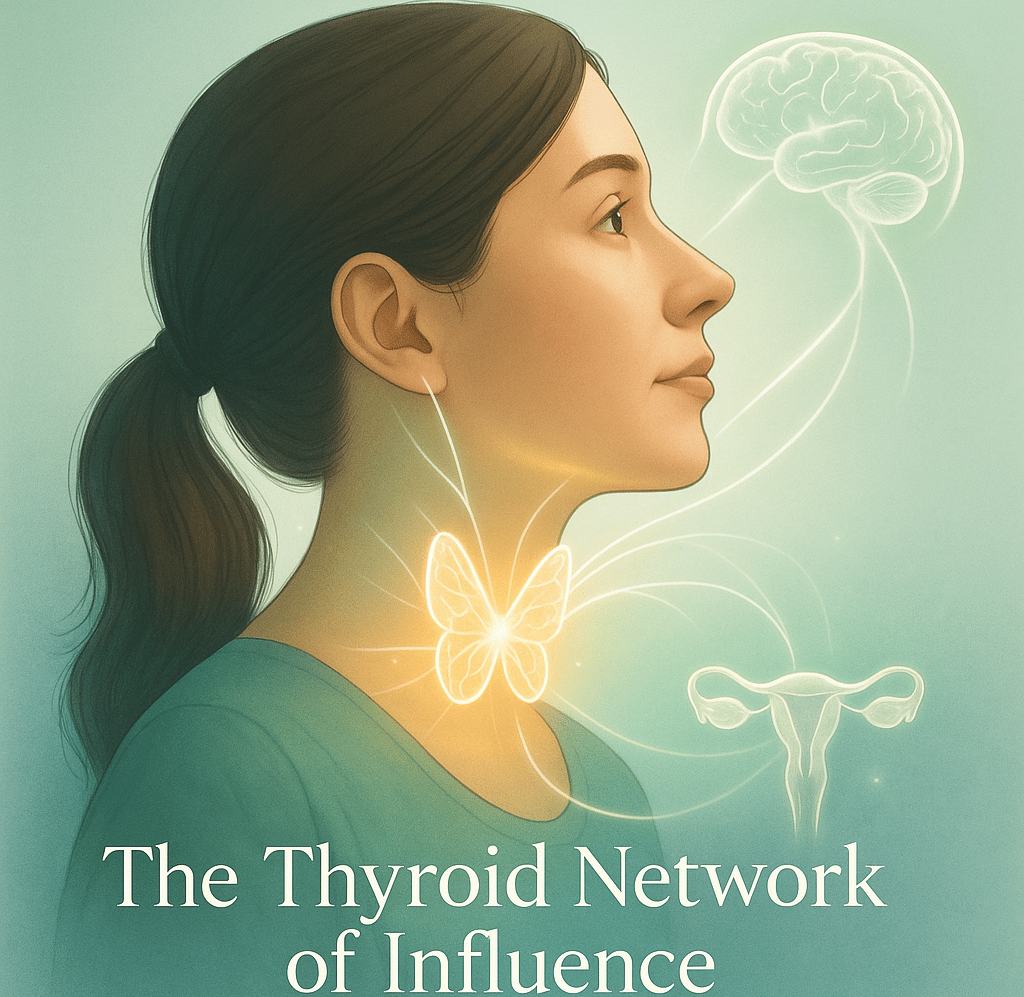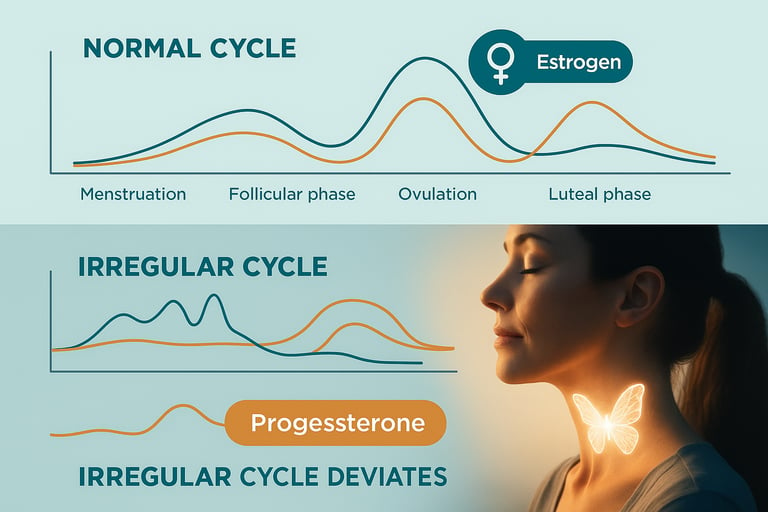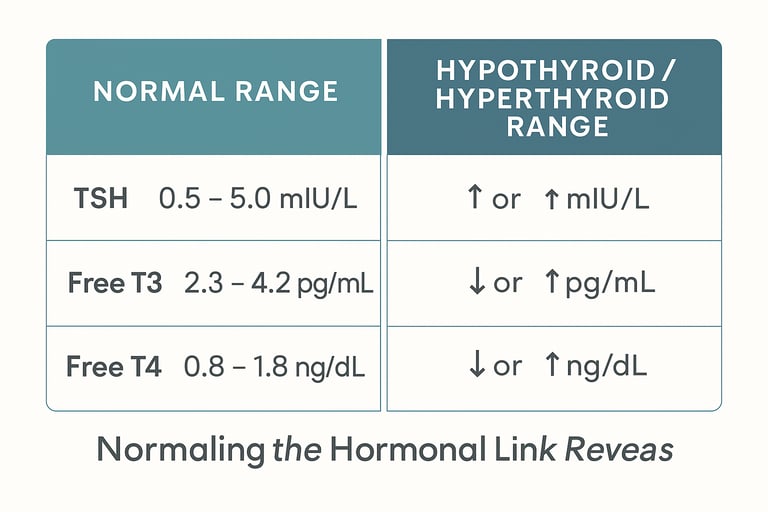Unraveling the Mystery Is Your Thyroid the Missing Link Behind Irregular Periods & Hormonal Chaos?
Discover the surprising link to your thyroid health. Learn symptoms, get tested, and find solutions to reclaim your rhythm. Don't wait find your regular Periods & Hormonal imbalance thyroid balance now!
10/1/20259 min read


Lost Your Rhythm Why Your Thyroid May Be Sneakily Disrupting Your Cycle
Imagine your body like a symphony orchestra. Each musician is crucial, playing to produce a calming melody. Now imagine your menstrual cycle, usually a reliable, rhythmic piece of music, abruptly becoming a cacophony of missed beats, erratic tempos, or choking crescendos. For many women, this is not a hypothetical scenario; it's the infuriating truth of irregular periods & hormone chaos. You track, you hope, you worry, most likely getting minimized or reassured that it's "stress." What if the tiny, butterfly shaped gland in your neck, which is normally taken for granted, is the behind the scenes maestro sabotaging your entire hormonal symphony?
The thyroid gland, though small, plays a gigantic role in controlling nearly every cell in your body, including those that govern your reproductive well being. When it doesn't work, even partially, the ripple impacts can turn a once reliable cycle into an infuriating mystery. This is not just an article of problem identification; it's an article of empowering you with knowledge to see the dots, understand the profound relationship between your thyroid and your cycle, and explore steps toward reclaiming your hormonal balance.
The Short Version
The thyroid is a master regulator: It governs metabolism, energy, and impacts reproductive hormones like estrogen and progesterone significantly.
Irregular periods are a frequent symptom: Both an underactive (hypothyroidism) and an overactive (hyperthyroidism) thyroid gland will disrupt menstrual periods, resulting in heavy, light, irregular, or absent periods.
It's all too often overlooked: The vast majority of women have thyroid related menstrual symptoms for years before the connection is made, so thorough testing is in order.
Something can be done: With proper diagnosis and treatment, typically with medicine, life style changes, and targeted care, hormonal balance can be restored.
Beyond the Calendar: The Secrets of Irregular Periods & Hormonal Chaos
What is an "irregular period," anyway? Although cycle duration varies, usually a normal cycle is between 21 and 35 days, and bleeding lasts 2 to 7 days. If your periods always are less than 21 days, more than 35 days, highly vary in length from one month to the next, include exceptionally heavy or light flow, or suddenly stop (amenorrhea), you're experiencing irregularity. These are not trivial nuisances; they're your body's warning signs that something deeper is amiss.
Hormonal chaos is a broader term for the chain of symptoms often that accompany menstrual irregularity. Think mood swings on a roller coaster, mysterious fatigue no amount of sleep can cure, persistent shifts in weight, hair loss, skin issues, and even infertility. They often overlap, presenting a complex picture which will leave you confused and frustrated. While a range of villains can be liable to this chaos PCOS, endometriosis, diet, stress the thyroid is often an overlooked culprit, working behind the scenes to pull the strings.
The Unsung Role of the Thyroid in Your Menstrual Symphony
The thyroid gland also releases the hormones T3 (Triiodothyronine) and T4 (Thyroxine), which play important roles in keeping the regulation of metabolism, energy metabolism, and even the receptiveness of your cells to other hormones in check. T3 and T4 are essentially the body's messengers, regulating everything in sync. And how do these metabolic hormones get in the way of your menstrual cycle?
The connection is multifaceted and profound. Thyroid hormones directly impact the synthesis and metabolism of estrogen and progesterone, the two main players in your menstrual cycle. Thyroid hormones influence the liver activity of metabolizing and excreting surplus estrogen, and they can potentially impact the pituitary gland, which controls the ovaries. When there is an excess or lack of thyroid hormones, this delicate balance is broken and there ensues a chain of effects:
Impact on Sex Hormone Binding Globulin (SHBG): Thyroid hormones regulate SHBG, a protein that binds sex hormones like estrogen and testosterone. An imbalance in SHBG will alter the amount of free (active) estrogen in your body, and this will directly impact ovulation and uterine lining development.
Disrupting Ovulation: The thyroid can affect the Hypothalamic Pituitary Ovarian (HPO) axis, which is your reproductive system's control center. Even mild thyroid disease can disrupt the delicate hormonal cues needed for healthy ovulation, leading to anovulatory cycles (egg-free cycles) or delayed ovulation.
Progesterone Production: Good ovulation is crucial for adequate progesterone production in the latter half of the cycle. When ovulation is interrupted by thyroid disease, progesterone levels will be low and can lead to abbreviated luteal phases, spotting, or heavy bleeding.
Adrenal Gland Connection: The adrenal and thyroid glands are closely related. Adrenal activity can be affected by long term stress, and once affected, further influence the thyroid and exacerbate the hormonal imbalance, creating a cycle of viciousness.
Approximately 20 million Americans suffer from some form of thyroid disease, but up to 60% have no idea. Women are four to eight times more likely than men to be affected by thyroid problems, making it a particularly attractive study area for individuals suffering from irregular menstrual cycles.
Hypothyroidism vs Hyperthyroidism Interruptions with the Same End Results
Both overactive and underactive thyroid can ruin your menstrual cycle, though the mechanisms and symptoms might differ.
Underactive Thyroid (Hypothyroidism)
If your thyroid gland produces too little hormone, the functions of your body slow down. For your menstrual cycle, this typically results in:
Heavy, Long Periods (Menorrhagia): Low thyroid hormones can create excess estrogen, causing the uterine lining to become too thick, resulting in heavy, long bleeding.
Irregular or Infrequent Menstrual Periods (Oligomenorrhea): HPO axis disrupted leads to delayed or no ovulation, thus longer or missed cycles.
Increased PMS Symptoms: Fatigue, mood swings, and bloating are all exacerbated by sluggish thyroid function.
Difficulty with Fertility: Anovulation and poor quality egg is experienced with untreated hypothyroidism.
General manifestations of hypothyroidism excluding menstrual include tiredness, weight gain, cold intolerance, dry skin, hair loss, constipation, and depression. Hashimoto's thyroiditis is the most common autoimmune disease leading to hypothyroidism in the United States, in which the immune system attacks the thyroid gland incorrectly (National Institute of Diabetes and Digestive and Kidney Diseases, 2021).
Hyperthyroidism (Overactive Thyroid)
Conversely, when your thyroid produces too much hormone, your body processes more rapidly. This can be described as:
Lighter, Shorter Periods (Oligomenorrhea or Hypomenorrhea): There is too rapid a breakdown of estrogen caused by an excess of thyroid hormones, resulting in reduced total stores of estrogen and thinner uterine lining, resulting in lighter or shorter periods.
Missing Periods (Amenorrhea): In severe cases, the hormonal imbalance will prevent menstruation altogether.
Irregular Periods: Cycles may become irregular and abnormal.
Fertility Problems: Too many thyroid hormones can block ovulation and cause miscarriage.
Other symptoms of hyperthyroidism include anxiety, palpitations, weight loss with increasing appetite, intolerance of heat, shaking, and inability to sleep. Graves' disease, yet another autoimmune illness, is the most common cause of hyperthyroidism (National Institute of Diabetes and Digestive and Kidney Diseases, 2021).
Diagnosing the Missing Link When to Suspect a Thyroid Problem
If you're dealing with ongoing irregular periods along with other issues such as chronic fatigue, weight changes that just don't make sense, mood swings, or hair loss, it's time to look at your thyroid. Don't accept blanket advice; push for thorough testing.
What Tests to Ask For
TSH (Thyroid-Stimulating Hormone): This is the most common initial test. TSH is secreted by the pituitary gland and instructs the thyroid to make more hormones. High TSH indicates an underactive thyroid (hypothyroidism), and low TSH indicates an overactive thyroid (hyperthyroidism). TSH does not reveal the whole story, though.
Free T3 and Free T4: These measures the level of available, free thyroid hormone circulating in your blood. These are important because one may still have symptoms even with normal TSH if the levels of T3 or T4 are not optimal.
Thyroid Antibodies (Thyroid Peroxidase Antibodies TPOAb and Thyroglobulin Antibodies TgAb): These can aid in the diagnosis of autoimmune thyroid disease like Hashimoto's (hypothyroidism) or Graves' disease (hyperthyroidism). When the antibodies are positive, your immune system is attacking your thyroid, even though your TSH is normal at present. This is important for the early detection and intervention.
It is worth taking the time to describe your symptoms and tests to a doctor knowledgeable in the nuances of thyroid wellness and its impact on fertility. An endocrinologist or a functional medicine doctor will likely offer a more complex perspective than a family doctor if your initial tests are borderline or if you continue to have symptoms despite being told your thyroid is "fine."
Your Action Plan Steps Towards Hormonal Harmony
Connecting your irregular periods with your thyroid is the first critical step. Followed by taking positive steps to restore balance. It's not meds; it's about a holistic approach.
Get Complete Diagnosis: As discussed above, insist on a whole thyroid panel (TSH, Free T3, Free T4, and antibodies). It provides a complete snapshot of your thyroid health.
Consult with an Experienced Practitioner: Find a doctor (endocrinologist, functional medicine practitioner, or integrative physician) who has thyroid experience and understands the nuanced relationship to women's hormonal health. They can advise you regarding proper treatment, which may include thyroid hormone replacement medication.
Prioritize Nutrient Dense Foods: An unprocessed, whole food diet can support thyroid function. Consume foods rich in iodine (seaweed, fish), selenium (Brazil nuts, eggs), zinc (oysters, pumpkin seeds), and B vitamins (leafy greens, legumes). Limit goitrogenic foods (raw cruciferous vegetables) if you have an underactive thyroid, especially if you are not getting a sufficient amount of iodine.
Manage Stress Well: Chronic stress is a gigantic disruptor of thyroid as well as hormonal health. Add stress reduction techniques like meditation, yoga, deep breathing, nature walks, or hobbies. Adrenal-thyroid connection is strong.
Sleep Adequately: Sleep 7-9 hours of quality sleep each day. Lack of sleep can exacerbate hormonal imbalance and negatively impact the thyroid.
Regular, Moderate Exercise: Exercise can help with metabolism, mood, and hormone balance. Don't over-exercise, as that can stress the body and worsen hormonal imbalance.
Reduce Environmental Toxins: So much of our world (plastics, pesticides, personal care items) has endocrine disrupting chemicals in it. Choose organic foods, filtered water, and natural personal care products when available to reduce your exposure.
A Targeted Solution We Trust
We've explored the way that an infinitesimal thyroid gland can send your whole hormonal equilibrium into a tailspin, leading to annoying irregular periods, mood swings, and energy sucking fatigue. So many women are stuck in this cycle, waiting to get balanced again. That's why we're so excited to introduce our selection for Thyrafemme Balance, a targeted supplement that fosters feminine thyroid equilibrium and corrects the very same issues we discussed.
Thyrafemme Balance is designed to be a gentle yet powerful companion on your journey towards hormonal balance. It is no fix it solution or a stimulant, but it offers maximum support by nourishing your thyroid and endocrine system. For instance, supplementing with Iodine (from Kelp), L-Tyrosine, Zinc, and Selenium targets the nutritional elements required for normal thyroid hormone formation and conversion that are typically deficient when cycles get irregular. Adaptogenic herbs like Ashwagandha and Schisandra help to counteract your body's stress response and cortisol levels, a critical element of hormonal bedlam that can further disrupt thyroid function. By supporting your body in managing stress more effectively, Thyrafemme Balance attempts to restore the delicate balance between your adrenals, thyroid, and reproductive hormones, culminating in more consistent cycles, solid energy, and improved mood. It's about providing your body with the intelligent support it needs in order to regain its own natural rhythm.
This formula is particularly tempting because it's about whole feminine wellness, and it understands that your thyroid doesn't function in a vacuum. By supporting metabolic health and helping with mood, hair, and skin all common areas that are affected by hormonal imbalance Thyrafemme Balance provides a comprehensive solution easily fitting into an active lifestyle. It's clean, natural, and effective without resorting to unnecessary fillers or stimulants, in keeping with a modern philosophy of active, gentle self care. Your next step toward hormonal balance is taking a closer look at Thyrafemme Balance.
Finding Your Rhythm Again What This Means For You
Existing with goofy cycles and the accompanying hormone chaos is devastatingly disempowering. It's a presence in every aspect of life, from physical ease and emotional balance to fertility aspirations. But acknowledging the potential role of your thyroid isn't just a medical comment; it's a doorway to claiming power and recouping your body's organic rhythm. It's grabbing beyond lackluster descriptions and insisting on an examination of your health on a deeper level.
By recognizing the thyroid as a potential missing link, you are giving yourself the power to ask the right questions and take certain actions. Taking back your hormonal balance isn't so much about fixing a calendar bug as it is about reigniting your energy, getting your mood back to normal, and feeling that fundamental sense of well-being. It's about connecting to the internal sense of your body once more, reclaiming that symphony which makes you thrive, not just survive. Your journey to hormonal balance can begin with a simple blood test, but it continues with wise choices and a commitment to care for your entire system. The harmony of a regular cycle, lost in the past, can be reclaimed.
References
American Thyroid Association. Thyroid Disease Statistics. (2023).
National Institute of Diabetes and Digestive and Kidney Diseases (NIDDK). Hashimoto's Disease. (2021)
National Institute of Diabetes and Digestive and Kidney Diseases (NIDDK). Graves' Disease. (2021)
Thurston, L. J., & Spevack, M. G. (2018). Thyroid disease and the menstrual cycle. The Journal of Clinical Endocrinology & Metabolism, 103(6), 2097-2106. (2018)
Poppe, K., & Velkeniers, B. (2009). Thyroid and fertility. Gynecological Endocrinology, 25(11), 693-699. (2009)




Health and Wellness
Your trusted source for health and fitness.
Connect
contact: beahealth.it@gmail.com
© 2025. All rights reserved.
